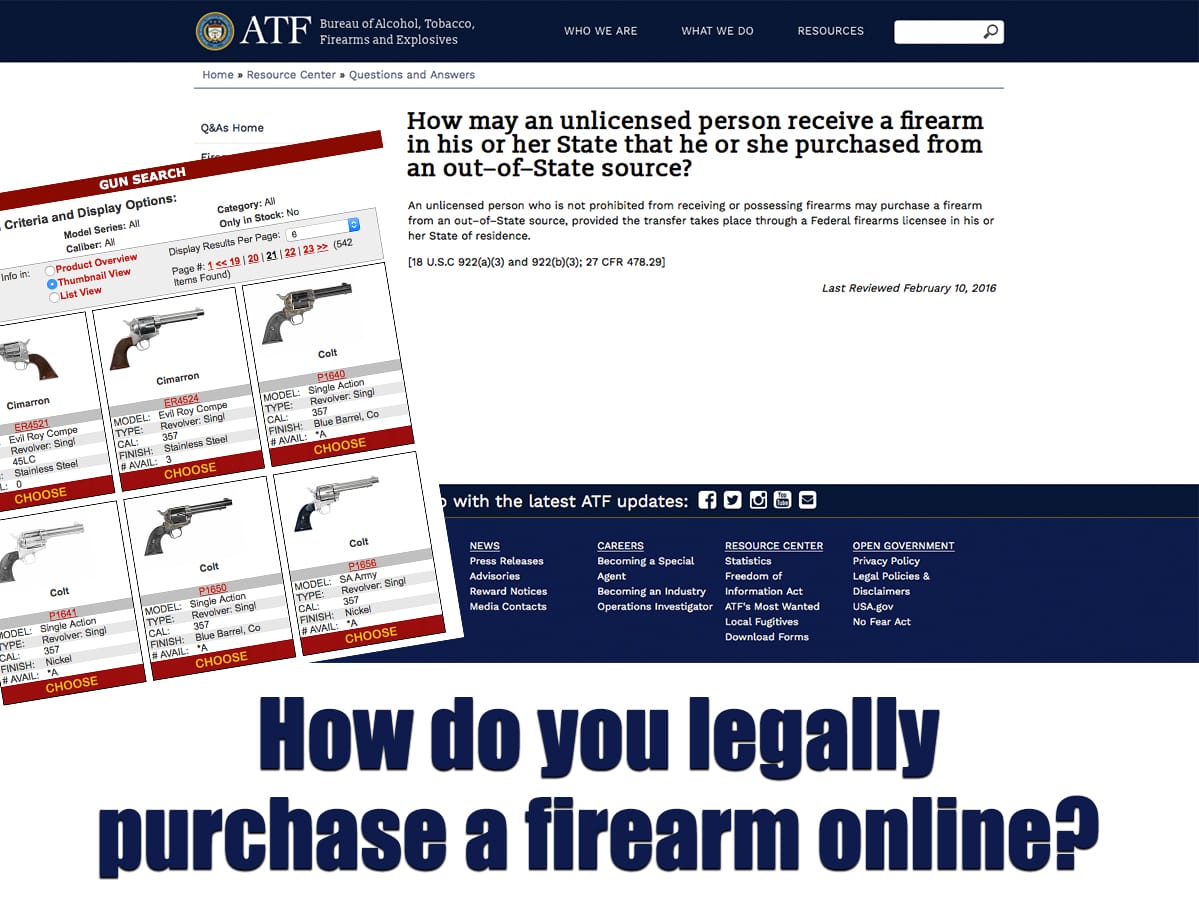Buying and Selling a Firearm: Online and Interstate Gun Sales
Tom McHale 06.16.16

Gun control supporters like to say “anyone can buy a gun on the Internet,” implying that criminals can anonymously order guns online and have them shipped to them directly, no questions asked. But it isn’t true.
In this fifth installment of our Buying and Selling a Firearm series, we’re going to cover interstate and so-called “online” gun sales. If you’d like to refresh your memory on the first four installments of the series, you can find them here:
- Buying and Selling a Firearm: What is an FFL?
- Buying and Selling a Firearm: Private Sales Explained
- Buying and Selling a Firearm: Gun Shows
- Buying and Selling a Firearm: Giving Someone a Gun
As we get started, be sure to remember that there are three levels of gun laws: federal, state, and local. Most states prohibit local jurisdictions from imposing gun control laws more restrictive than state law. However, be sure to check for any local laws that may apply. The easy place to check state laws is the National Rifle Association’s Institute for Legislative Action website at https://www.nraila.org/gun-laws/state-gun-laws/.
Interstate Gun Sales
Federal law for interstate gun sales and other transfers – those occurring between two people who are not Federal Firearm Licensees (FFLs) who live in different states — is pretty straightforward. A person who is not an FFL cannot acquire a handgun from anyone – an FFL or any other person – who lives in another state. A person (the “transferee”) acquiring a long gun must do so through a licensed dealer (FFL). It can be an FFL in any state, the transfer must comply with the laws of the FFL’s and the transferee’s states.
(For more on why it’s important to understand interstate gun sales, check out how “Under the Gun” producers may have broken federal law with illegal interstate gun purchases.)
To begin the transfer process for a long gun acquired interstate, the transferee must fill out a form 4473 which requires identification information and requires the transferee to answer questions stating that he or she is not acquiring the firearm for someone else (other than as a gift), and that he or she is not prohibited by law from possessing firearms. It’s a federal felony to provide false information on a form 4473, so read the questions carefully.
The FFL then calls the FBI or a state law enforcement agency, depending on the state in which the transaction is taking place, and the transferee will be screened through the National Instant Criminal Background Check System and, in some states, state databases of persons prohibited from possessing firearms. Once the check is completed successfully, usually a matter of only a few minutes, the FFL may transfer the firearm.
The only exceptions relate to things like gun repairs. If you need to send your gun out of state to an FFL manufacturer, you can so do directly without going to a local FFL. That FFL manufacturer can also send your gun back to you directly.
“Online” Sales
As noted earlier, federal law doesn’t allow a person to order a firearm online and have it shipped to him or her across state lines directly. A person can shop online, do research online, identify a firearm, and even pay for it, but the transfer will still have to go through an FFL, with a Form 4473 and a background check.
Perhaps the most common online sales scenarios are also the easiest to navigate. If you choose to buy a gun online from a well-known retailer or wholesaler like GalleryofGuns.com, much of the process is automated. Many of these sites walk you through the process, right down to the point of choosing a local FFL dealer who has already agreed to receive incoming transfers from that online seller. Pick your gun, pay for it online, then pick it up at your local dealer. Many times, the whole process can be completed within 48 hours.
Any confusion that has arisen over “online” sales has been generated by gun control supporters who are trying to get federal and state law changed to prohibit private transfers of firearms. However, as with gun shows, there is no loophole for “online” sales. The same laws apply whether one buys a gun by mail, phone, online, or by using smoke signals. All interstate sales must go through an FFL, with a Form 4473 and a background check.
When a firearm transferor and transferee live in the same state, the online part is simply the means of communication for two private individuals to conduct business. That’s already legal under federal law anyway, so the online element is irrelevant. According to the ATF, “Any person may sell a firearm to an unlicensed resident of the State where he resides as long as he does not know or have reasonable cause to believe the person is prohibited from receiving or possessing firearms under Federal law.”
Of course, state law may regulate a private sale between two parties in the same state, regardless of whether they communicate in person or online. For example, Oregon now requires a background check for any type of transfer between two people in the state including sales, loans or anything else.
Check your state’s laws at the NRA-ILA website for details.
Deciphering federal and state laws can be a daunting task. Fortunately, the National Rifle Association’s Institute for Legislative Action keeps on top of the changing landscape and publishes current laws on its website. Before buying or selling a gun in state or across state lines, be sure to take advantage of this valuable resource.

